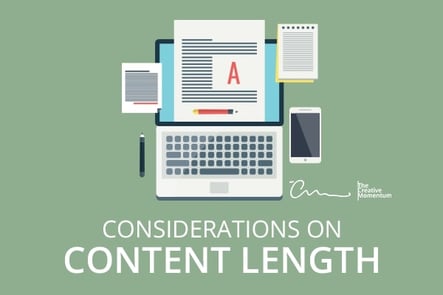
Eighty percent of people will only read the headline or first few lines of an article and move on. So, with that in mind, keep your content to the point and have a nice day.
Ok, headlines matter. That doesn’t come as much of a surprise to anyone, but the reality is that people have different expectations of the content that they engage with. Target market, industry, and the nature of the content all factor into the expectations users have about length. Context is key. So with that in mind, here are several key considerations about content length.
Promotional Offers are Best Kept Brief
Whether it’s an email campaign, CTA, paid ad, or otherwise, when you’re openly trying to sell something, it’s best kept brief. You don’t want to be that guy at the party who can’t stop talking about how he destroyed the latest quotas or the "investment opportunity" (read: multi-level marketing scheme) that you can't miss out on. Nobody likes that guy. People zone out. A brief description of the perks to your service or an upcoming sale might catch someone's eye. A short novel will not.
Businesses and Consumers Navigate the Sales Process Differently
Whether your sales are B2B or B2C changes the equation. Consumers tend towards emotional purchases, whereas businesses care about their bottom line. An executive or business owner may be interested in the nitty-gritty of your service. How does it compare to others? What are you offering that's exceptional? What’s your business model? How exactly does your product work? All of these subjects can be explored to considerable depth when you have the attention of an interested party.
Consumers may also care about the specifics of a product or service, depending upon the industry. However, in general, it's a smarter bet to focus on brand imaging and emotional appeal. These aspects of a marketing campaign are generally better conveyed in short bursts, rather than lengthy discourse.
Some Resources Call For a Higher Level of Detail
The flip side to all this is that content can also be too short. There are times when a user expects an in-depth discussion and will be disappointed to find a brief paragraph or two reasserting the headline. If your goal is to impart valuable industry information or technical description, then there's no need to shy away from longer discussions.
White papers, tutorials, and other educational materials can be great inbound marketing tools to showcase your expertise and reel in leads. These types of resources are typically geared towards B2B sales but may have a place in consumer purchases as well. They also tend to be quite lengthy.
Podcasts, documentaries, and other media can be longer as well. When you’re exploring an aspect of your industry or business to someone that’s already showed enough interest to delve into that level of detail, shorting them for the sake of brevity isn’t going to do you any favors.
Whatever type of content you release, it's best to stay focused. Keeping things to the point is usually a good call, but don't shortchange yourself in the interest of your readers. There are times when people want to explore a subject in depth. It's up to you to recognize those moments and capitalize.

